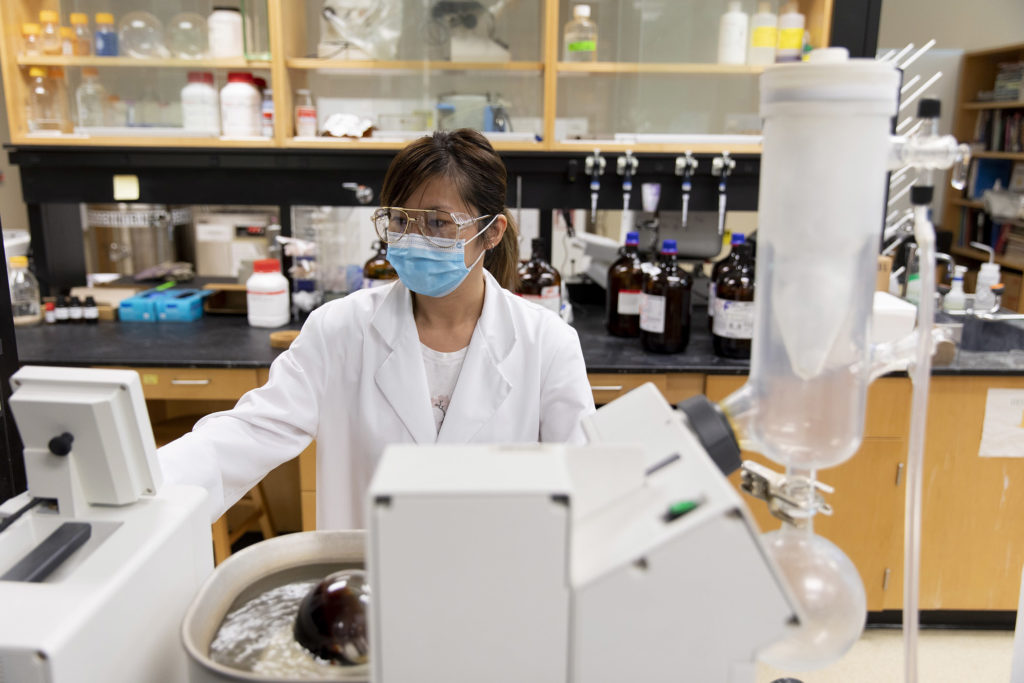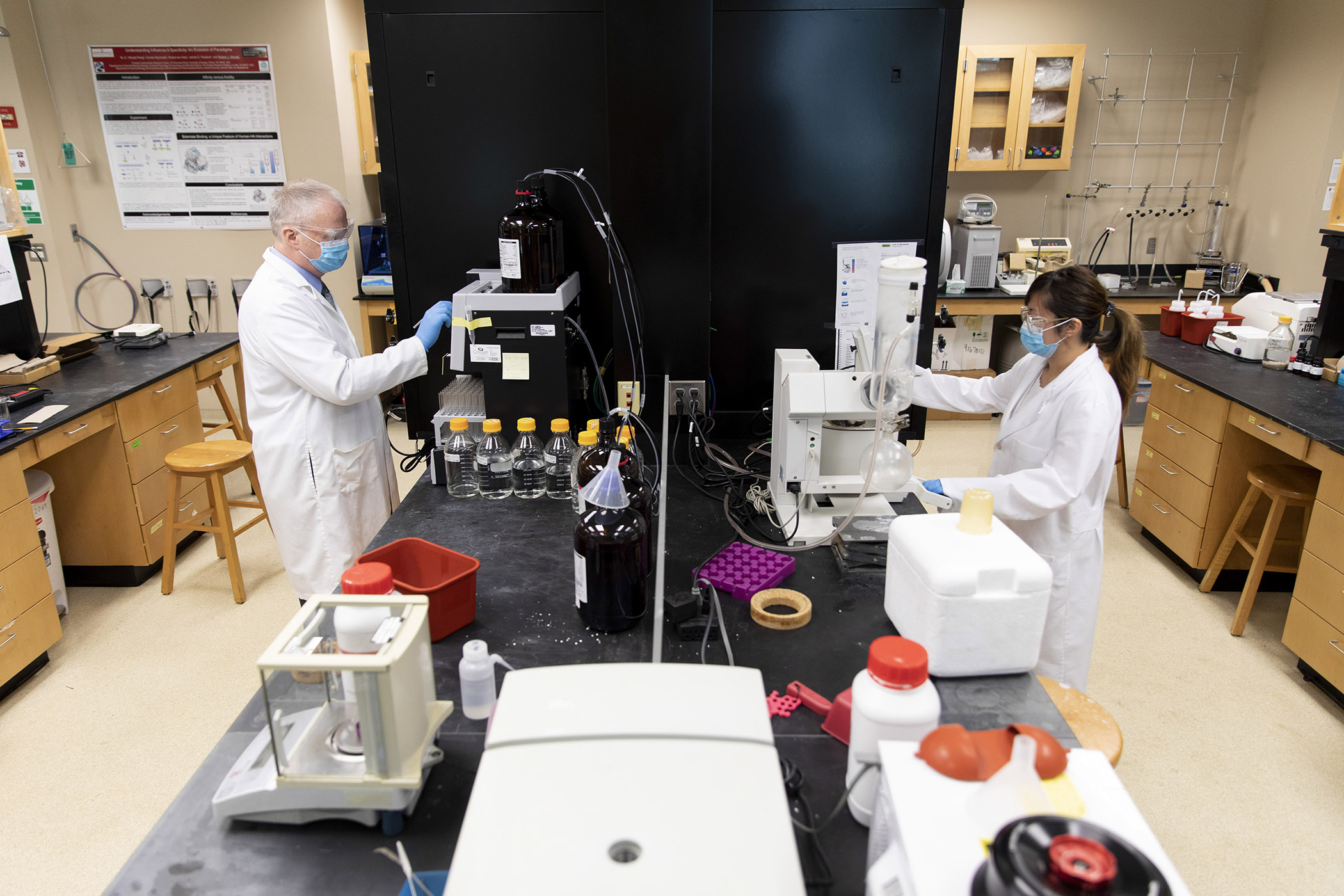When the University of Georgia began its Phase 1 reopening of campus, that marked the end of three anxious months for researchers across the university who had to suspend their work as the country grappled with the coronavirus pandemic.
Still, while many laboratories and other research spaces have been ramping activity back up, life for UGA researchers post-COVID-19 will—at least initially—look quite different.
On May 29, the Research Work Group released its requirements for a phased return to nonessential onsite research activities. Primary among those requirements was the need for investigators to submit a Research Resumption Plan that would explain how they intended to manage social distancing and sanitation in their labs upon reopening. Once their RRP was approved, investigators could then resume their onsite research work beginning June 15.
“Our correspondence with other R1 institutions indicated that many adopted phased resumption plans in which a percentage of the research workforce was allowed to return, or administrators chose which research to prioritize,” said David Lee, vice president for research, who co-chaired the Research Work Group along with Michelle Momany, associate dean of the Franklin College of Arts and Sciences.
“We decided instead to give the faculty discretion over which research activities to resume, as long as their plans met specified workplace health and safety requirements,” Lee said.
With its 17 schools and colleges spanning hundreds of scholarly and creative disciplines, UGA’s research enterprise is nearly as varied as its faculty. Anticipating the issues and concerns of every type of research space was the work group’s biggest challenge, Lee said. The good news is that—social distancing notwithstanding—complying with health and sanitation requirements should be fairly routine for many of UGA’s bench scientists.
“People who work in labs spend a lot of time thinking about cross-contamination, keeping things clean, wearing personal protective equipment—these are all things we normally do anyway,” said Nancy Manley, Distinguished Research Professor and head of genetics in Franklin. “In many ways, this is the easy part.”
However, the story in other disciplines is quite different. For example, according to department head David Saltz, UGA’s theater program is staring down the prospect of a 2020-21 season with no live audiences, no costume fittings or sets to design, and no face-to-face interaction for actors and directors. Other companies might despair, but Saltz said the UGA theater community is preparing to turn crisis into opportunity.
“We see our role in a research-intensive university as to explore the concept of theater,” Saltz said. “Particularly, our department has been at the leading edge of experimentation with digital technologies in live performance. So we’re planning to do this season entirely online, and we’re taking advantage of the resources in our department, which are considerable, in things like computer animation and special effects.”
There are also the special needs of remote research locations. When the campus reduced operations on March 13, that decision included all UGA facilities around the state. Some of those locations have particular practices that have been greatly complicated by COVID-19.

The UGA Marine Institute on Sapelo Island shut down about 90% of its activity when the lockdown hit (some projects in the NSF-funded Georgia Coastal Ecosystem Long-Term Ecological Research program were deemed essential and allowed to continue). As the UGA Marine Institute ramps back up, it not only must consider lab safety, but also the safety of its housing facilities and even its modes of transportation on the island. The UGA Marine Institute also hosts visiting researchers from around the country, whose home institutions have their own reopening requirements that must be considered.
“I feel good about the plan we have in place,” said Merryl Alber, UGA Marine Institute director. “Clearly we can’t accommodate the same number of people that we normally can, but all the field stations around the country are facing the same challenges.”
Another hurdle is shared facilities and instrumentation. Manley said she is requiring her faculty to coordinate with all the other labs on their building floor regarding the use of common spaces and shared equipment like autoclaves. “Nobody’s lab is truly autonomous from everyone else’s,” she said.
“We’re in Miller Plant Sciences, and we share the building with other departments and units on campus,” said John Burke, Distinguished Research Professor in plant biology. “We have several instruments that other labs in the department use. That creates another layer of complexity because we have to coordinate with people outside the lab so they can have access while still making sure we can get done what we need to get done.”
And then there are the administrative duties that accompany research. With most staff working remotely during reduced operations, Office of Research functions like sponsored projects administration, research integrity and safety, technology transfer and others operated at or near capacity.
However some duties—lab safety inspections, for example—simply could not be performed, and COVID-19 has also left a new set of challenges in its wake. Sponsored Projects Administration staff have been reaching out to faculty whose projects are approaching completion to determine how the pandemic affected them and whether any time extensions or additional funding should be requested from their sponsors.
Even with these complications, Phase 1 still represents a welcome return to scholarly activity for a significant portion of UGA faculty.
“I greatly appreciate the patience, understanding and cooperation of the faculty during this unprecedented pause in activities,” Lee said. “I know how difficult it was for them. Likewise, I appreciate UGA leadership for allowing researchers to commence research in Phase 1 ahead of many other activities.”


